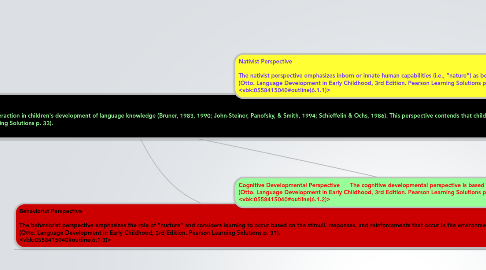THEORETICAL PERSPECTIVES
by Carrie Prouty

1. Behaviorist Perspective The behaviorist perspective emphasizes the role of “nurture” and considers learning to occur based on the stimuli, responses, and reinforcements that occur in the environment. (Otto. Language Development in Early Childhood, 3rd Edition. Pearson Learning Solutions p. 31). <vbk:0558415040#outline(6.1.3)>
2. Interactionist Perspective The interactionist perspective focuses on the primary role of sociocultural interaction in children's development of language knowledge (Bruner, 1983, 1990; John-Steiner, Panofsky, & Smith, 1994; Schieffelin & Ochs, 1986). This perspective contends that children acquire language through their attempts to communicate with the world around them. This perspective contributes to our understanding of the ways in which children acquire pragmatic language knowledge. (Otto. Language Development in Early Childhood, 3rd Edition. Pearson Learning Solutions p. 33). <vbk:0558415040#outline(6.1.4)>
3. Cognitive Developmental Perspective The cognitive developmental perspective is based in the work of Jean Piaget (1955). The emphasis of this perspective is that language is acquired as maturation occurs and cognitive competencies develop. (Otto. Language Development in Early Childhood, 3rd Edition. Pearson Learning Solutions p. 30). <vbk:0558415040#outline(6.1.2)>
3.1. New node
4. Nativist Perspective The nativist perspective emphasizes inborn or innate human capabilities (i.e., “nature”) as being responsible for language development. Linguist Noam Chomsky is the major theorist associated with the nativist perspective. (Otto. Language Development in Early Childhood, 3rd Edition. Pearson Learning Solutions p. 27). <vbk:0558415040#outline(6.1.1)>


